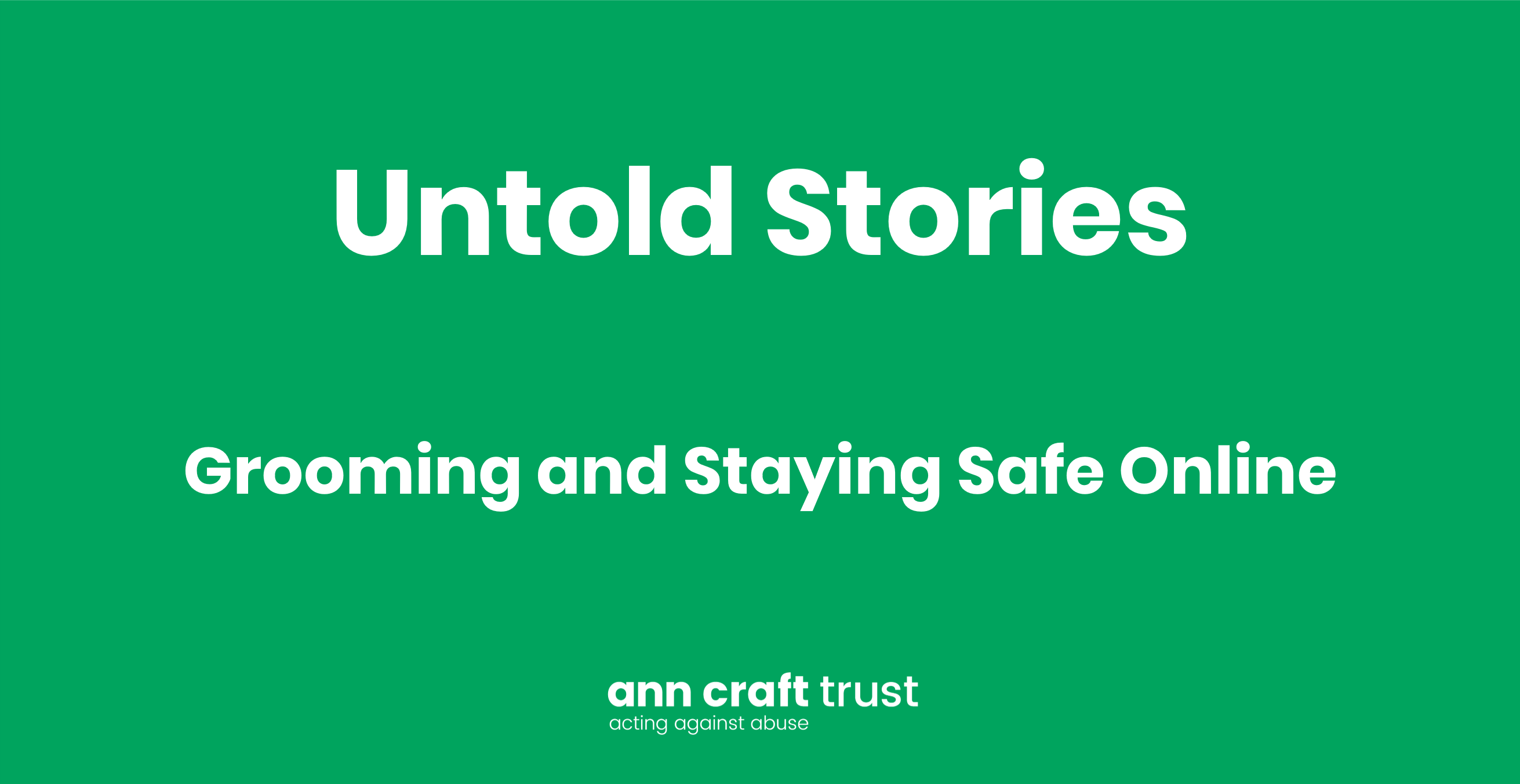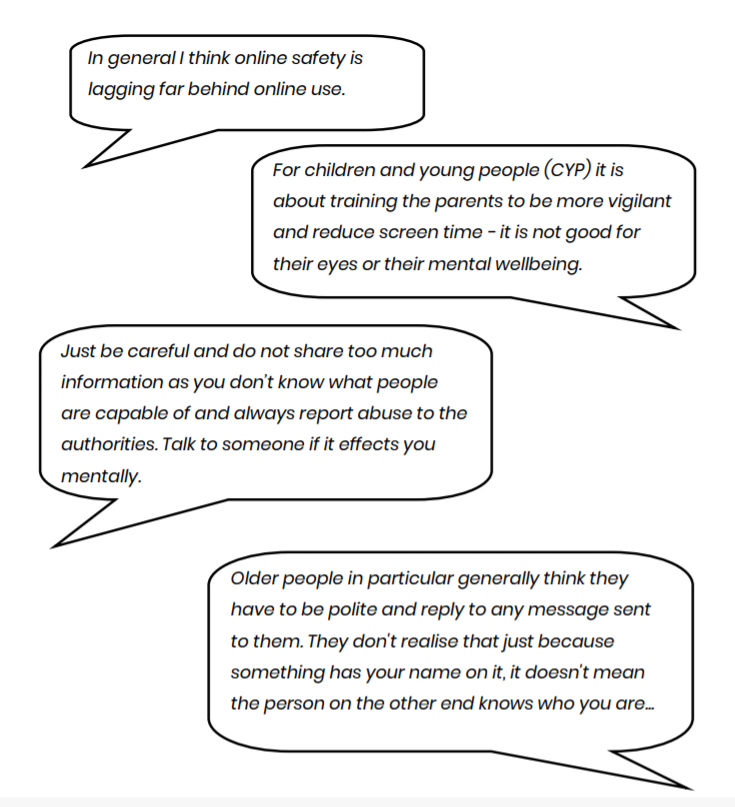
What do you do to keep yourself and others safe online?
As part of our ACT Untold Stories focus on adult grooming and online safety, we ran an open survey on our website.
Here are some initial findings from this survey:
- Two-thirds of respondents feel they spend too much time online.
- 37% of respondents spend more than 10 hours a week online outside of work hours.
- 51% of respondents have received formal online safeguarding training—either to keep themselves or others safe online.
- 88% of respondents have encountered online scams. 17% have experienced targeted harassment, and 11% have experienced cyber bullying.
- 91% of respondents believe that “common sense” is the best way to stay safe online. 85% use online safety apps, while 71% attempt to stay private online.
- 55% of respondents think that awareness training for individuals is the best way to help people stay safe online. 18% think that harsher penalties for cyber crimes would make a difference, while 12% think that less online anonymity will help keep people safe.
We also invited respondents to share their views on online safety, and how we might help keep others safe online. Here are some of the responses we received:

A Collection of Digital Safeguarding Resources
Respondents to our survey told us that training and access to up-to-date and reliable advice and guidance could make a huge difference in helping people stay safe online.
We’re always working to ensure our resources are as reliable and accessible as possible. If you need help with something that’s not currently covered by our digital safeguarding resources, get in touch and let us know.
What is digital safeguarding?
A good definition of safeguarding is taking proactive steps to prevent harm and abuse from occurring. At the same time, good safeguarding practice means you’ll know what to do if harm or abuse ever takes place: who to contact, what to tell them, and how to help the person who’s experienced abuse.
So what’s digital safeguarding? It’s the same idea, but in a digital space. Digital safeguarding simply means taking steps to stay safe online.
Why is Digital Safeguarding Important?
In 2020, as a result of enforced government lockdowns, many people in the UK may have spent more time online than ever before. From work meetings to school lessons and exercise classes, many things that we used to do offline we now do online.
But even without enforced lockdowns, people in the UK still spend a lot of time online.
According to the Office of National Statistics, in 2019:
- 99% of UK adults aged 16 to 44 were recent internet users, compared to 47% of adults aged 75 or over.
- Only 7.5% of UK adults didn’t use the internet at all.
- 78% of adults with disabilities were recent internet users. For the first time ever, the annual figure exceeded 10 million.
If so many of us are spending so much time online, obviously we need to know how to keep ourselves safe online.
When it comes to safeguarding, prevention is always better than a cure. It’s always better to prevent abuse from happening in the first place than it is to respond to an incident of abuse.
Digital safeguarding is no different. We should know how to use the internet safely and sensibly, and we should all be aware of the risks we face online.
Digital Safeguarding Resources
Over the years, we’ve created and collected a number of digital safeguarding resources:
What is Cyber Bullying?
When people use digital services to abuse or harass others, we call it cyber bullying.
This post will help you spot the signs of cyber bullying, while also offering tips on how to protect yourself from online bullies. Read more.
How to Stay Safe Online
A collection of general tips, including advice on online conduct and behaviour, and essential cyber security tips (such as setting a good password!) Read more.
Safeguarding and Online Youth Work
This helpful guide includes information on using technology to deliver youth work provision and responding to safeguarding risks when working with young people online. Read more.
Guidance for Adults and Young People with Learning Disabilities
A selection of easy-read guides to staying safe online, with helpful images and clear and simple language. Read more.
Supporting People Who Have Been Abused Online
It’s vital that we take steps to prevent abuse from happening in the first place. But it’s just as important that we know how to respond to instances of abuse.
This is a collection of resources to help parents, guardians, and others in positions of care support young people who have been abused online. Read more.
Creating Safer Online Spaces
A guide to setting and maintaining safeguarding standards when delivering certain services online, such as teaching or exercise classes. Read more.
Beware of Online Scams
Though this resource refers explicitly to the scams that appeared in the early days of lockdown, it’s still a good introduction to the sort of techniques online criminals use to exploit others.
This will give you an idea of the sort of red flags you should look out for to determine whether something is authentic, or a scam. Read more.
Photography Guidance
Is it illegal to take a picture of a child or young person under 18? Not necessarily. But there are still precautions you should take when taking and sharing photos of yourself and others. Read more.
The Digital Safeguarding Resources Pack
This is an overview of digital safeguarding principles, plus lots of actionable tips for different scenarios.
In 2020, Comic Relief commissioned AVA (Against Violence and Abuse) to develop and deliver digital safeguarding training to organisations.
AVA developed a resource pack to accompany their training sessions. But they’ve also posted these resources online, for any organisations that need a primer on staying safe online.
As well as general digital safeguarding tips, the resource pack also features guidance for organisations that have switched to online working under lockdown.
Access the digital safeguarding resources pack here.
The Online Sexual Harm Reduction Kit
Produced by The Marie Collins Foundation in collaboration with the National Working Group. This guide addresses the challenges professionals face when working with young people experiencing online harm.
It contains information about:
- What online harm is.
- The specific issues young people are
facing. - How professionals can effectively
engage with young people and their
families.
Head here to read the guide in full.
More Digital Safeguarding Resources
What sort of digital safeguarding resources would you like to see?
If you need further guidance for staying safe online, please get in touch to let us know.
